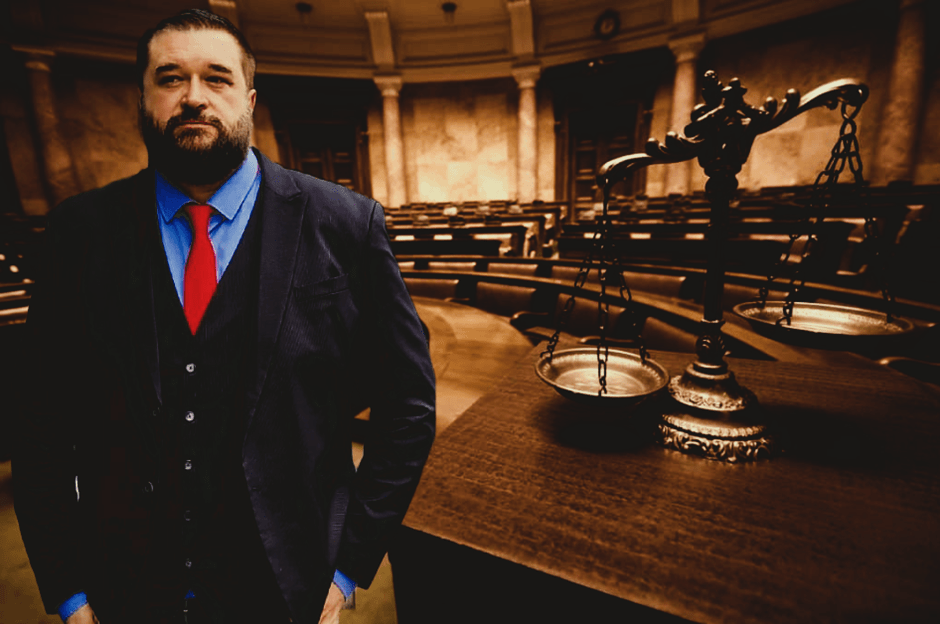
Prepared by Emily Edwards
05/08/2023
Today we head to Lewisham, London for a conversation with social activist and lawyer Iliyan Kuzmanov, who in his spare time has dedicated himself to helping society. What we will try to understand from it is what is the importance of the grant in the legal profession. After all, we are used to everything having to be paid for from somewhere. Which, in the case of legal aid, implies that our budget funds and pays the lawyers or advisers who help those who cannot afford a lawyer. The painful question is, do we not create more clumsy and inefficient bureaucracy that weighs on our budget. Reason why we turn to a lawyer that is also a social entrepreneur who has managed to generate more than three million pounds from business alone invested back into our society by himself simply because he has derived pleasure from doing so.
Iliyan Kuzmanov was born on February 3, 1979, in Pazardzhik, Bulgaria. Hailing from the small town of Kalugerovo, he comes from a significant noble family with deep ties to Bulgarian and Ottoman history. The legacy of his family, known for their contributions to education and religion, instilled in him a sense of duty towards society. Kuzmanov is the heir to a family of wealthy farmers and merchants who built schools, libraries, and churches in their community. Driven by a thirst for knowledge and a desire to make a difference, Kuzmanov pursued higher education in Bulgaria and Canada. He studied law in Plovdiv, Bulgaria, before venturing to Concordia University in Montreal, Canada, where he specialized in history and economics. The diverse cultural experiences gained during his travels through Asia, including Thailand, Myanmar, and Vietnam, shaped his perspectives and influenced his writing. His first work largely examines the foundations of monarchy and the role of religion in successful Asian Societies.
In 2011, Kuzmanov made London, England, his new home and founded the social business Angel Social Group. Through this initiative, he aimed to address the pressing social issues of homelessness and inequality. Project Ezo, a part of Angel Social Group, emerged as a beacon of hope for the homeless community. It not only provided shelter and support but also exhibited and sold art created by homeless individuals. The project’s success propelled Kuzmanov to expand his social entrepreneurship endeavors. In 2020, Kuzmanov established the Art Angel Foundation in Bulgaria, focusing on combating violence against women, human trafficking, and corruption. The foundation operates the Open Cultural Space “Esoligencia,” which serves as a multicultural hub for people of different communities, ethnicities, beliefs, and sexual orientations. Through various projects, such as the Maria Project and the Prison Social Business Development Project, Art Angel Foundation raises awareness and provides support to vulnerable individuals and communities.
Kuzmanov’s commitment to social change extends to his work as a journalist-activist. He has authored international analyses and investigations, covering topics such as political analysis, human rights, personal development, and social entrepreneurship. As the owner of the independent website theangel.today, Kuzmanov launched the Hybrid Fortress project, aiming to uncover the links between Russian influence and Bulgaria. He believes that digitalization and the penetration of technology in institutions can combat corruption and inefficiency. Kuzmanov’s literary contributions have made a significant impact on the literary world. His debut novel, “If You Meet Buddha, Kill Him!,” achieved unprecedented success, becoming the first book by a Bulgarian writer to enter Amazon’s Top 20 best-selling titles. The novel’s unique blend of magic realism and political fiction captivated readers and established Kuzmanov as a talented writer with a distinct voice. His second novel, “The Devil I Know Him!,” garnered international recognition succeeding December 2022 to top quite a few prestigious charts, displacing authors like Stephen King and John Grisham. The book is seen by many as a philological narrative exploring the roots of the Rule of Law in our society.
Iliyan Kuzmanov himself has been subjected to numerous threats and abuses in Bulgaria due to his strong voice against corruption and malicious influences, forcing him to move permanently to the UK. Events that made him rethink the role of legal aid in our society and the huge need for quality legal aid.
In the legal profession, pro bono work plays a crucial role in serving the public good and promoting justice and equality– begins the conversation with Iliyan– lawyers who engage in pro bono work provide legal services for free or at a reduced cost to individuals and organizations who cannot afford legal representation. This practice not only benefits those in need but also offers numerous advantages for attorneys themselves. From diversifying their experience to building professional networks and contributing to their communities, lawyers have numerous reasons to prioritize pro bono work in their practice.
Diversifying Experience through Pro Bono Work
One of the key benefits of pro bono work for lawyers is the opportunity to diversify their experience and expand their skill set. Often, pro bono cases involve areas of law that may not be the attorney’s primary focus. By taking on pro bono cases, lawyers can gain practical, on-the-ground experience in different practice areas. For example, a litigator who has never argued in court or a corporate lawyer who has never negotiated a contract can develop these essential skills through pro bono work. This diversification of experience ultimately makes lawyers more well-rounded and better equipped to serve their clients effectively. But this should be a major field for enriching our experience, not a place for people with low morals to easily enrich themselves on the backs of our budget or the poorest and most unprotected members of our society.
Networking and Collaboration in Pro Bono Work
Pro bono work also provides lawyers with valuable networking and collaboration opportunities. Engaging in pro bono cases often requires lawyers to work with other legal professionals, both within and outside their firm. These collaborations not only benefit the clients but also establish meaningful relationships and expand professional networks. By working alongside like-minded professionals who share a commitment to pro bono work, lawyers can form lasting connections that may lead to future collaborations and referrals. The legal industry, while vast, can be tightly knit in specific practice areas or locations, and pro bono work facilitates the development of these important professional relationships. But again, I want to emphasize the positive aspect, not the careerist stepping stones for low-skilled individuals eager for big legal paychecks.
Self-Fulfillment in Serving the Public
Lawyers are driven by a variety of motives when choosing their profession. Many enter the legal field with the desire to make a positive difference in people’s lives and contribute to the greater good. Pro bono work allows lawyers to honor this intention and find self-fulfillment in their practice. By providing legal services to underserved individuals and communities, lawyers can help bridge the justice gap and ensure that everyone, regardless of their financial means, has access to capable legal representation. Pro bono work serves as a reminder of the true purpose of practicing law and allows lawyers to reconnect with their commitment to helping others. Because Pro Bono work is our bench mark of people called to serve the Law of morality, ethics and professionalism.
Advancing Justice through Pro Bono Work
The legal profession has a long history of advancing justice and protecting the rights of individuals and society as a whole. Lawyers have a unique role in safeguarding society and promoting the rule of law. The concept of lawyers serving as “enlightened political leaders” or “the people’s lawyers” has deep roots in the profession. Pro bono work aligns with these ideals and allows lawyers to fulfill their obligations as lawyer-statesmen. By providing pro bono legal services, lawyers contribute to the advancement of justice, protect the rights of the marginalized, and ensure equal access to good legal services for all. In this way, we as lawyers are helping our country in a difficult economic time. State funding of legal aid in many cases means a drain of public funds from our tax dollars into the hands of low-skilled, incompetent and morally devoid individuals.
Addressing the Access to Justice Gap
In the United Kingdom, there is a significant gap between the need for legal services and the ability of individuals to afford them. The cost of legal services continues to rise, making it increasingly challenging for many people to access the legal representation they require. Pro bono work plays a crucial role in addressing this access to justice gap. By offering their services for free or at a reduced cost, lawyers can provide much-needed legal assistance to those who cannot afford it. This not only helps individuals navigate the legal system but also contributes to a more equitable and just society.
Managing Pro Bono Work alongside Billable Casework
While the benefits of pro bono work are clear, managing it alongside billable casework can be challenging for lawyers. Time and energy constraints often make it difficult to dedicate sufficient attention to pro bono cases. However, there are strategies that lawyers can employ to effectively manage pro bono work alongside their regular caseload.
Leveraging technology is one such strategy. Law practice management software can streamline the management of pro bono cases. These tools offer features that help lawyers differentiate between pro bono work and paid work, track time and expenses, and manage tasks and deadlines. By utilizing technology, lawyers can better allocate their time and resources to pro bono cases and ensure that they fulfill their professional responsibility to provide legal services to those in need.
Tracking time and expenses is essential for both record-keeping and planning purposes. Lawyers should accurately track the time spent on pro bono cases, including the time of support staff involved. This allows for better allocation of resources in future pro bono cases and helps lawyers meet their annual pro bono service requirements. Additionally, keeping detailed records of expenses incurred while representing pro bono clients ensures transparency and accountability.
When considering taking on a pro bono case, lawyers should carefully assess their availability. It is essential to ensure that there is sufficient time and capacity to devote to the case, especially for complex matters that may require extensive attention. Choosing pro bono cases that align with personal passions and interests can also help maintain motivation and engagement throughout the process.
The Biggest Legal Assistant of our Society will soon be Artificial Intelligence
But the big game changer is technology and its implementation in legal work. They save us both time and money, while making our job immeasurably easier. And right now, with the advent of Artificial Intelligence in the administration of our work, things are just drastically changing for our convenience. What’s more, Artificial Intelligence is becoming an autonomous legal assistant that can cover a huge portion of the things we provide to the public. So I can safely declare, the biggest legal assistant of our society will soon be Artificial Intelligence.
Pro Bono Work: Changing Lives and Making a Difference
Ultimately, pro bono work allows lawyers to make a tangible difference in the lives of individuals and communities. By taking on pro bono cases, lawyers have the power to give voice to the voiceless, fight for justice against all odds, and bring hope to those who need it most. Whether representing domestic violence victims, refugees, nonprofits, or individuals with limited means, pro bono work enables lawyers to contribute to a more just and equitable society. The rewards of pro bono work extend beyond financial gain, providing lawyers with a sense of purpose, fulfillment, and the opportunity to leave a lasting impact on the lives of others.
In my opinion pro bono work is not only important but essential in the legal profession. It allows lawyers to diversify their experience, build professional networks, fulfill their commitment to serving the public, advance justice, address the access to justice gap, and ultimately make a positive difference in the lives of individuals and communities. By incorporating pro bono work into their practice, lawyers can enhance their skills, contribute to a more equitable society, and find self-fulfillment in their legal careers.
In conclusion, I have always believed that lawyers and medics are professionals who should have extremely high moral and ethical standards!
Ethical standards are crucial in the professional practice of law and healthcare providers. Both professions are bound by codes of ethics that guide their interactions with clients and patients. High ethical principles include informed consent, which involves providing clients with sufficient information about the proposed course of action, risks, and alternatives. Lawyers must respect and accommodate clients’ decisions, while healthcare professionals must facilitate informed decision-making for patients. Physicians have an ethical obligation to help patients understand available therapeutic alternatives and make informed decisions based on their preferences and best medical practices. Respecting privacy and maintaining confidentiality are vital aspects of both fields, and professionals must follow strict guidelines to protect confidential information. Shared ethical standards between legal and healthcare professionals emphasize the importance of thoughtful, informative, and client/patient-centered communication. Adherence to these ethical principles fosters trust, promotes positive outcomes, and prioritizes the well-being of clients and patients. After all, every day they hold in their hands human lives and destinies that they can save or destroy.
As for the good lawyer, a manifestation of his morality should be Pro Bono legal aid. After all, good health care is practically available to everyone, almost everywhere in the world, something that should be the case with law!
Through his activism, writing, and social entrepreneurship, Iliyan Kuzmanov has emerged as a prominent voice for freedom and democracy. His fight against corruption, human trafficking, and totalitarianism have made him a symbol of resistance in Bulgaria. As he continues to challenge the status quo and spark conversations that transcend borders and cultures, Kuzmanov’s legacy as a true freedom fighter lives on.
Iliyan Kuzmanov’s journey as a freedom fighter has been marked by his relentless dedication to defending Democratic values and challenging oppressive regimes. From his early life in Bulgaria to his education in Canada and his social entrepreneurship initiatives in London and Bulgaria, Kuzmanov has consistently fought for social change. His literary achievements and recognition further solidify his position as a prominent writer and advocate for freedom. As Kuzmanov continues to make a difference through his activism, journalism, and social initiatives, his impact on society will undoubtedly endure. He is a true inspiration and a beacon of hope for those fighting for a better and more just world.



























